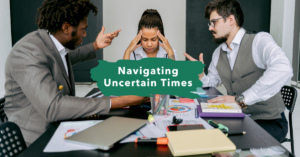In modern business, change is not just a constant but an accelerating force. Senior HR leaders are at the forefront of guiding organizational stakeholders through change, tasked with not only managing but also leading and supporting others during business transformation. As such, HR leaders need to be at the helm of planning change initiatives, driving them with strategic foresight and people-centric approaches.
The journey begins with a thoughtful line of questioning meant to elicit what additional inputs and resources may be necessary before endeavoring change. Consider the following elements related to fostering change agility and the related questions to ask when planning a new initiative.
Change Governance
It’s crucial for HR leaders to create a robust governance framework that outlines roles, responsibilities, and decision-making processes. This ensures that everyone is aligned and working towards the same goals. By securing executive sponsorship, HR can gain the support needed to drive change across the organization. Engaging stakeholders early and often can help build buy-in and ensure that their voices are heard throughout the change process.
- Are you equipped to establish a governance structure that ensures change initiatives are well-planned and executed?
- How will you secure executive sponsorship and engage stakeholders effectively?
- What strategies could you use to ensure everyone is aligned and working towards the same goals?
Timing and Agility
Timing is everything when it comes to change. HR leaders need to have a deep understanding of the organization’s current state and future goals to determine the best time to implement change. Being agile and adaptable is also crucial, as unexpected challenges and opportunities can arise at any time. HR leaders need to be able to quickly pivot their strategies and plans to ensure that change initiatives are successful.
- What organizational factors will help you gauge the right timing for your change initiatives?
- Are you able to pivot and adapt quickly to changing circumstances and organizational needs?
- What measures will you take to ensure that unexpected challenges and opportunities are addressed promptly?
Supporting Multiple Initiatives
With organizations undergoing constant change, HR leaders often find themselves juggling multiple change-related initiatives at once. Prioritizing these initiatives based on their impact and urgency is key. HR leaders need to be strategic in their approach, ensuring that each initiative is given the necessary attention and resources to succeed. This may involve delegating tasks, reallocating resources, or reevaluating priorities as needed.
- How will you balance and prioritize multiple change initiatives?
- What strategies might you use to ensure each initiative receives the necessary attention and resources?
- How will you delegate tasks, reallocate resources, or re-evaluate priorities to ensure success?
Measuring Impact
Gauging the effectiveness of change initiatives is crucial for determining their impact and identifying areas for improvement. HR leaders need to establish clear metrics and KPIs that align with the organization’s goals and objectives. This allows them to track progress, identify early warning signs, and make data-driven decisions to ensure the success of their change initiatives.
- How will you measure the success of your change efforts?
- Do you have clear metrics and KPIs in place to track progress and make informed decisions?
- How might you use data to identify areas for improvement and ensure the success of your change initiatives?
Communication and Transparency
Effective communication is essential during times of change. HR leaders should be transparent about the reasons for change, the expected outcomes, and the impact on employees. This helps build trust and credibility with employees and keeps them engaged and motivated throughout the process. HR leaders should use a variety of communication channels, such as town hall meetings, email updates, digital message boards, and/or one-on-one meetings, to ensure that employees are informed and feel heard.
- How do you approach communication during change?
- Are you able to keep employees informed and engaged throughout the process?
- What communication channels do you use to ensure employees are informed and feel heard?
Forward-Looking Change Agility
As the body of knowledge related to change management continues to evolve, HR leaders need to stay informed about the latest trends and best practices. This may involve attending conferences, participating in webinars, or joining professional networks. By staying connected to the broader HR community, HR leaders can learn from others’ experiences and apply new insights to their own change initiatives.
- How do you stay informed and up-to-date on best practices in change management?
- What resources or networks do you find most valuable for professional development in this area?
- How do you apply new insights and trends to your own change initiatives?
For HR leaders, embracing these challenges and mastering the art of change agility is not just about managing transitions; it’s about shaping the future of work for your organization. By taking a proactive and strategic approach, HR leaders can drive meaningful change that enhances organizational performance and creates a more agile and resilient workplace.
Connect with us!
Looking for great consultants that commit to your success? Apeiron provides a one-stop shop to access some of the best consultants in the central Indiana area. Want to learn more? Simply submit the contact form below and we’ll find a time to learn more about your situation and how we might work together.
About the Authors: Craig Andrews

Craig has a unique blend of skills with over 24 years of operations management experience (including Plant Manager) in the printing and packaging industries and 16 years of senior leadership in continuous improvement at a major food company.
He has been a leader in traditional manufacturing, start-ups, and acquisitions. During these assignments, Craig has extensive experience in coaching and organizational development including the facilitation of leadership growth and cultural transformations internationally ranging from executive levels to production hourly associates. In addition, he is highly skilled at facilitating and teaching continuous improvement methods and tools, such as: Simple Root Cause Analysis / Problem Solving, Mapping, Lean, 5S, and Visual Management. Craig has a strong reputation for creating dynamic, interactive, and fun training sessions leading to change back at the workplace.
About the Authors: Jessica Stephenson

Jessica Stephenson is the owner of Mosaic BizOps LLC, a consulting firm specializing in change management, employer branding and fractional marketing for HR consultants. She is passionate about working at the intersection of marketing strategy, employee experience and organizational process design to help individuals and organizations inclusively achieve optimal workforce productivity.
Stephenson holds her SHRM-CP and PHR certifications and is on the executive committee for the State Council of HR Indiana SHRM while serving as a co-chairperson for the annual HR Indiana Conference. She lives in central Indiana with her husband, son and daughter.




